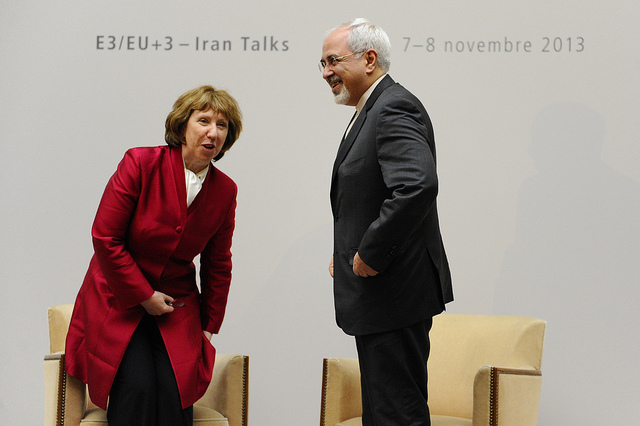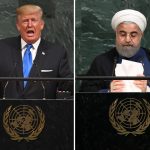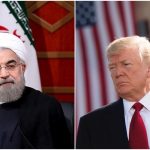by Peter Jenkins
Sometimes the fog of diplomacy can be as thick as the fog of battle. So it has been in the case of last week’s talks in Geneva — until, that is, the publication of an account in The Guardian by Julian Borger and Ian Traynor, which rings true, to my mind at least.
On that basis a preliminary assessment of why hopes that had been raised high were dashed can be attempted.
The crucial factor appears to have been French insistence on re-opening a text that Iran believed to have been essentially agreed upon and pressing Iran on two points: the cessation of work on the Arak reactor for at least six months and end-state assurance about the future of Iran’s enrichment program.
On Arak, fairness requires conceding reason to France. The Arak reactor is a legitimate proliferation concern. An initial agreement that lacked any confidence-building provision in relation to Arak would be like a house without one of its walls.
On the end-state enrichment assurance point, however, the French intervention is hard to excuse. The E3+3 (the U.S., Britain, France, China and Russia plus Germany) have known since last year’s meetings with Iran, if not longer, that Iran cannot volunteer confidence-building measures in the absence of such an assurance, for fear of being nickel-and-dimed. And some accounts of last week’s meetings suggest French officials raised no objection to the inclusion of an assurance when the text was being negotiated at an official level.
So what was the French Foreign Minister’s game? Some observers believe that this was an act of sabotage, intended to appease the Prime Minister of Israel and curry favour with the rulers of Saudi Arabia and the UAE, in the hope of commercial gain.
That may be right. French diplomacy can be selfish. But French diplomacy is rarely stupid. So it is improbable that French Ministers and officials would imagine that their EU partners would forgive them for putting French commercial interests, or the appeasement of a state whose policies in the West Bank are considered deeply unjust by most Europeans, ahead of the interests of the EU as a whole. EU interests are to seize what may be a last opportunity to resolve the Iranian nuclear dispute peacefully, to reopen the Iranian market to hard-pressed EU traders and investors, and to give the global economy a boost from lower oil prices.
An alternative explanation could be that Mr. Laurent Fabius intended to trade an end-state assurance for a satisfactory provision on Arak, hoping perhaps to avoid having to pay for the latter with additional sanctions relief. If so, he misjudged his man. Iran’s Foreign Minister is happy if he can get others to pay twice for a concession but doesn’t go in for paying twice himself!
The Guardian account also prompts at least one question about US diplomacy. Why did Secretary of State John Kerry fail to point out to his French colleague that reopening the text on so vital a point to Iran was likely to prove a deal-spoiler? Around this question the fog remains dense.
Where does all this leave the outlook? Less promising than when I last wrote. US and UK public announcements that the E3+3 are united, and the tactless (and unfair) blaming of Iran for the break-down, suggest a lack of will to form up to France on the end-state assurance. This can be a recipe for failure when the parties reconvene on Nov. 20.
EU Ministers could come to the rescue by stressing that they expect France to put EU interests first and their conviction that the Nuclear Non-Proliferation Treaty (NPT) does not prohibit Iran from enriching uranium for peaceful purposes. But will they? Hitherto they have been reluctant to assert themselves on the Iranian nuclear question.
Were my advice requested (which I do not expect!) I would advocate that the parties look for a way out of these difficulties by dropping the idea of a two stage (initial/comprehensive) agreement and instead, over the next five weeks, aiming, through intensive negotiations, to produce a broad agreement that dispels all uncertainty on the points that are crucial to one side or the other.
Both sides have already given so much thought to the issues that such a goal would be realistic as long as political will to resolve this dispute peacefully continues to exist. An early broad agreement that was demonstrably in the interests of all parties (and of the global community) would strengthen the political positions of governments vis–à–vis opponents of a deal by attracting public support. There is much to be said for wrapping up the essentials of a peaceful settlement before the further round of US sanctions legislation that appears to be in the offing.
Photo Credit: European External Action Service – EEAS






The fog of battle. The French scuttle this round, to curry favor with the Saudis, who just happen to have some kind of pact with the Israelis, the U.S. saying nothing, because the Israelis own Washington, sounds quite reasonable to me. The sad part being, letting Netanyahoo dictate the outcome, to hell with the world, he shines, at least in his own mind.
Why should Iran concede on Arak? It is within the NPT and Iran will not stop building it.
I believe that this is very sound advice. There is a deep level of mutual suspicion between Iran and the West. Since the inconclusive end of the talks in Geneva, a number of Iranian newspapers including Keyhan, which is the unofficial mouthpiece of Iran’s Supreme Leader, have openly criticized an interim agreement because they say that the West is again going to cheat Iran. They have given as an example the agreement that was reached between Iran and the European Troika (Great Britain, France and Germany) in 2003 when the current President Hassan Rouhani was Iran’s chief negotiator. According to the agreement, which came to be known as Sa’dabad Palace Declaration, Iran accepted a voluntary suspension of all its enrichment activities and also joined the Additional Protocol, although the Majles refused to ratify it when talks failed. The Iranians expected the suspension to be a confidence-building measure that would last no longer than six months. However, two years later when they met in London they were told that the West wanted “zero enrichment” on Iranian soil and the suspension had to be made permanent. Many rightwing Iranians believe that the West is playing the same game again, although the circumstances have changed completely, especially as the United States is directly involved in the negotiations.
Nevertheless, as Ambassador Jenkins points out all sides have thought a great deal about the issue and the outlines of an agreement are well known. After all they have been talking about the issue for the past ten years. It is time for a bold decision to agree on the final shape of the settlement. This would prevent the hardliners in Iran from losing faith and trying to block an agreement. Also any delay would make the agreement a hostage to fortune and would get the US Administration involved in a protracted battle against the hawks in Israel and in the Congress. The next meeting between Iran and the P5+1 on 20 November is at the level of experts. Another meeting should be scheduled at the ministerial level shortly afterwards and the whole issue should be sorted out. Delay will not achieve anything and will only complicate the issues. A failure at this stage would be more dangerous for all than if no talks had been held.
Fine assessment. I think France will accept Iranian enrichment to low levels.